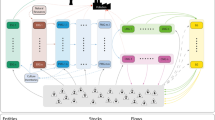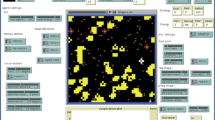Abstract
In this research, an agent-based simulation seeks to discuss the tragedy of the commons, collective intelligence and institutions developed by social groups. The concept of the tragedy of the commons states that you can always expect environmental degradation when many individuals freely exploit a scarce resource of common use. Hardin (Science 162:1243–1248, 1968) proposes two alternatives to deal with it: state or privatized administration. However, it is possible another alternative of self-coordination when the social groups are small. That is, the tragedy of the commons could be faced when the synergy within the group—collective intelligence—develops. The focus of this paper is to analyze small groups who promote their coordination to achieve collective goals, aimed at the preservation and perpetuation of scarce natural resources of common use. The results of this research show that the extreme exhaustion of the environment and consequent dissolution of the group that depends on it, is easily observed in many circumstances. However, in small groups, the self-coordination through the development of strong institutions may avoid an eventual tragic outcome of total environment degradation. Additionally, it has been found that social identity influences the behavior of the individuals, determining the social structures.

Similar content being viewed by others
References
Agrawal A (2014) Studying the commons, governing common-pool resource outcomes: some concluding thoughts. Environ Sci Policy 36:86–91
Akerlof GA, Kranton RE (2000) Economics and identity. Q J Econ 115(3):715–753
Ashforth BE, Mael F (1989) Social identity theory and the organisation. Acad Manag Rev 14(1):20–39
Axelrod RM (1997). The complexity of cooperation: Agent-based models of competition and collaboration. Princeton University Press, Princeton
Azevedo AI, Martins HT, Drummond JAL (2009) A dinâmica institucional de uso comunitário dos produtos nativos do cerrado no município de Japonvar (Minas Gerais). Sociedade e Estado 24(1):193–228
Berger P, Luckmann T (1967) The social construction of reality: a treatise in the sociology of knowledge. Anchor, NY
Bezlepkina I, Brouwer F, Reidsma P (2014) Impact assessment of land use policies: introduction. Land Use Policy 37:1–5
Blader SL, Tyler TR (2009) Testing and extending the group engagement model: linkages between social identity, procedural justice, economic outcomes, and extra role behavior. J Appl Psychol 94(2):445–464
Brinton M, Victor Nee (1998) The new institutionalism in sociology. Russell Sage Foundation, NY
Carley KM (2009) Computational modeling for reasoning about the social behaviour of humans. Comput Math Organ Theory 15:47–59
Centola D, Willer R, Macy M (2005) The emperor’s dilemma: a computational model of self-enforcing norms. Am J Sociol 110(4):1009–1040
Chen R, Chen Y (2011) The potential of social identity for equilibrium selection. Am Econ Rev 101(6):2562–2589
Cole DH, Epstein G, McGinnis MD (2014) Digging deeper into Hardin’s pasture: the complex institutional structure of ‘the tragedy of the commons’. J Inst Econo 10(3):353–369
Davis LE, North DC (1971) Institutional change and American economic growth. Cambridge University, Cambridge
Dimaggio PJ, Powell WW (1983) The iron cage revisited: institutional isomorphism and collective rationality in organizational fields. Am Sociol Rev 48:147–160
Dinger V, Steinkamp S, Westermann F (2014) The tragedy of the commons and inflation Bias in the Euro area. Open Econ Rev 25:71–91
Epstein JM, Axtell R (1996) Growing artificial societies: social science from bottom up. The Brookings Institution, Washington
Falk T, Vollan B, Kirk M (2014): Tragedy of the commons. In: Morin JF, Orsini A (eds.) Essential concepts of global environmental governance. Routledge, Abingdon
Feeny D, Berkes F, McCay BJ, Acheson JM (1990) The tragedy of the commons: twenty-two years later. Human ecology 18(1):1–19
Fioretti G (2012) Agent-based simulation: models in organisation Science. Organ Res Methods 16(2):227–242
Ford A (2010) Modelling the environment. Island Press, Washington, DC
Furubotn EG, Richter R (2008) The new institutional economics: a different approach to economic analysis. Economic Affairs 28(3):15–23
Ghaffarzadegan N, Lyneis J, Richardson GP (2011) How small system dynamics models can help the public policy process. Syst Dyn Rev 27(1):22–44
Gotts NM, Polhill JG, Law ANR (2003) Agent-based simulation in the study of social dilemmas. Artif Intell Rev 19(1):3–92
Granovetter M (1973) The strength of weak ties. Am J Sociol 78(6):1930–1938
Hardin G (1968) The tragedy of the commons. Science 162(3859):1243–1248
Harrison JR, Carroll GR, Carley KM (2007) Simulation modelling in organisational and management research. Acad Manag Rev 32(4):1229–1245
Hinkle S, Brown R (1990) Intergroup comparisons and social identity: some links and lacunae. Soc Identity Theory 48:70
Karnani A (2014) Corporate social responsibility does not avert the tragedy of the commons. Case study: Coca-Cola India. Econ Manag Financ Markets 9(3):11–33
Leimeister JM (2010) Collective intelligence. Bus Inform Syst Eng 2(4):245–248
Mantzavinos C, North DC, Shariq S (2004) Learning, institutions, and economic performance. Perspect Polit 2(1):75–84
Manzungu E, Mangwanya L, Dzingirai V (2012) Can collective action lead to sustainable outcomes in the provision and management of domestic water in Zimbabwean urban areas? J Sustain Dev 5(5):65–75
Nixon R (2015) Neoliberalism, Genre and “The Tragedy of the Commons”. In: Bernard A, Elmarsafy Z, Murray S (eds) What postcolonial theory doesn’t say. Routledge: Collection “Routledge Research in Postcolonial Literatures”
North DC (1991) Institutions. J Econ Perspect 5(1):97–112
Nowak A, Rychwalska A, Borkowski W (2013) Why simulate? To develop a mental model. J Artif Soc Soc Simul 16(312):1–9
Olson M (1971) The logic of collective action: public goods and the theory of groups. Harvard University Press, Cambridge
Ostrom E (1990) Governing the commons: the evolution of institutions for collective action. Cambridge University Press, Cambridge
Pinho PF, Orlove B, Lubell M (2012) Overcoming barriers to collective action in community-based fisheries management in the Amazon. Hum Organ 71(1):99–109
Sarker A, Ikeda T, Abe T, Inoue K (2015) Design principles for managing coastal fisheries commons in present-day Japan. Ecol Econ 117:32–38
Schmid AA (2007) Conflict and cooperation: institutional and behavioural economics. Land Econ 83(2):280–283
Schuler D (2008) Civic intelligence and the public sphere. In: Toovey M (ed) Collective intelligence: creating a prosperous world at peace. Earth Intelligence Network, Oakton
Toyokawa W, Kim H, Kameda T (2014) Human collective intelligence under dual exploration-exploitation dilemmas. PLoS One 9(4):e95789
Uhrmacher AM (1996). Object-oriented, agent-oriented simulation: implications for social science applications. In: Troitzsch KG et al. (Org.). Social science micro simulation: a challenge for computer science. Berlin: Springer Lecture Notes in Economics and Mathematical Systems
Wang H, Shao J, Cai M (2014) Is self-governance of the commons feasible in the PRC? A case study of pasture governance in Zhua Xixiulong township, Gansu province. Asia Pac J Pub Adm 36(3):211–219
Woolley AW, Chabris CF, Pentland A, Hashmi N, Malone TW (2010) Evidence for a collective intelligence factor in the performance of human groups. Science 330(6004):686–688
Zagonel AA, Rohrbaugh J, Richardson GP, Andersen DF (2004) Using simulation models to address “what if” questions about welfare reform. J Pol Anal Manag 23(4):890–901
Zhang W, Zeng W, Fu X, Pan J (2011) Economic analysis on the tragedy of the river. J Manag Sustain 1(1):124–132
Author information
Authors and Affiliations
Corresponding author
Rights and permissions
About this article
Cite this article
Morano, R.S., de Moraes, E.A. & Jacomossi, R.R. Can small groups avoid the tragedy of the commons?. AI & Soc 33, 71–80 (2018). https://doi.org/10.1007/s00146-017-0720-9
Received:
Accepted:
Published:
Issue Date:
DOI: https://doi.org/10.1007/s00146-017-0720-9




